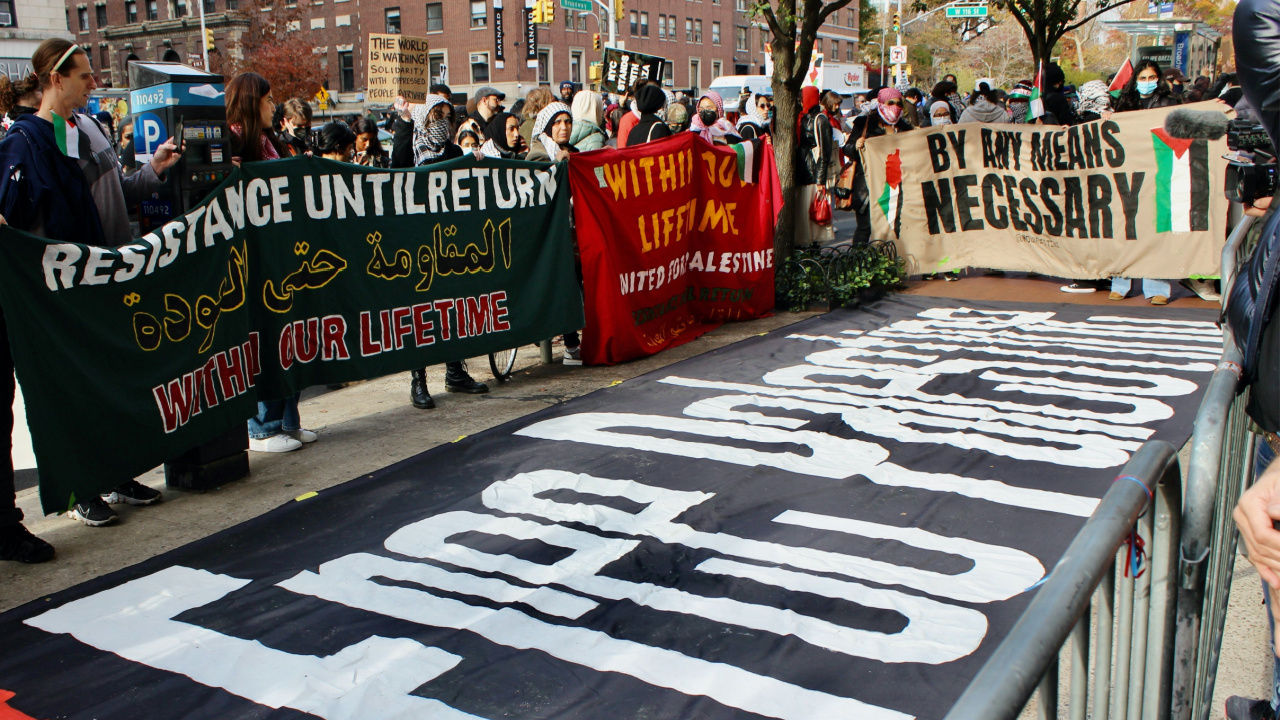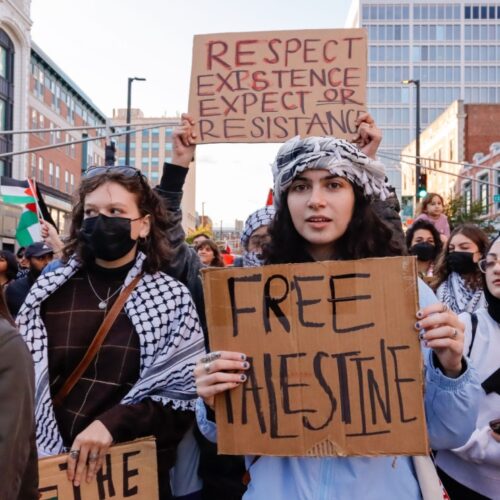Is Free Speech Worth Defending?

Editor’s Note: Our country is threatened by the emergence of a new totalitarianism, the group quota regime, or what many now recognize as “wokeness.” In order to achieve its goals, the group quota regime must erase both substantive inheritances of the Western tradition (like the belief in objective and discernible truth) and procedural inheritances (like the commitment to free speech and the open pursuit of knowledge). Those who oppose this emerging totalitarianism must now make strategic and tactical decisions — including, perhaps, when to defend one good at the expense of another.
For instance, what do we do when faced with a choice between immediate moral imperatives (the need to extinguish woke radicalism — and woke violence — on campus) and long-cherished, highly valued norms and safeguards (the guarantee that academics will not be silenced for voicing unpopular opinions)? Which choice has the clearer moral foundation? Which is the surer path to victory? These questions inspired a compelling exchange between Yoram Hazony and Robert George in the pages of Public Discourse. Both essays are excerpted below at length.
Hazony: “Absolute Free Speech” Is a Self-Defeating Proposition
The universities, through an excess of liberality and toleration, have permitted the establishment on campus of organized groups of administrators, faculty, and students that are pursuing an aim that has nothing whatsoever to do with establishing a “campus culture of robust free inquiry.” These are not supporters of free speech and independence of mind. They are unblushing totalitarians and apologists for the most extreme forms of violence imaginable. Their ideology of total war, combined with their vicious techniques of suppressing all opposition, have ended even the limited degree of free speech and inquiry that once existed at the universities.
How did this happen? It happened because the universities, pandering to the demands of neo-Marxist revolutionaries speaking in the name of blacks and other minorities, suspended the old boundaries of legitimate speech and debate. Indeed, whatever these activists were writing or teaching, or doing to intimidate other faculty and students, or foisting upon university administrators so as to better control the campus, was protected by the principles of “free speech” or “academic freedom.” That is what allowed the hiring of anti-white and anti-Semitic faculty. It allowed these faculty members to exercise a veto over appointments and curriculum decisions. It allowed the establishment of entire departments designed to provide a supportive environment for their doctrines. It allowed these faculty to organize themselves into campus-wide pressure groups capable of intimidating university administrators, forcing changes in university policies, and firing faculty that stood in their way. It allowed the capture of disciplinary organizations and accrediting boards. And it allowed, during and after the George Floyd riots in 2020, the conquest of the university administrations and their co-optation into the cause of neo-Marxist and Muslim supremacist revolution.
Further calls for free speech and free inquiry are wildly inadequate to these circumstances. We must recognize that these principles, while worthy in themselves, cannot defend the university against organized movements of fanatical administrators, faculty, and students bent on conquering and transforming it into an institution devoted to promoting hatred and revolution. It’s not just that they failed to prevent the transformation of the liberal university of the 1980s into a training facility for bigotry, hatred, and revolutionary action against whites, Jews, and other “oppressor groups” in the 2020s. In the form of a senseless and unworkable commitment to “absolute free speech,” these principles were in fact crucial to nurturing, advancing, and protecting the neo-Marxist revolution in the universities. …
Four Crucial Principles in Addition to “Free Speech”
The principles of free speech and inquiry have proved not only impotent, but counterproductive in the face of organized neo-Marxist and Islamic supremacist groups seeking to make the prestige and power of the universities their own. So it is only reasonable that we should at this time emphasize additional principles that are relevant to our present circumstances.
What other principles should be emphasized in the effort to restore the university? Here are four:
1. The university is an educational institution. To be an educational institution, a university must be a certain kind of human organization. In particular, it must be hierarchically ordered, passing certain norms of behavior and speech down from the instructors and administrators to the students. This is true of even the most tolerant of educational institutions—because tolerance of the free speech and inquiry of others is not natural to human beings, but must be taught. Where free speech and inquiry exists, it is only thanks to disciplined instruction in a hierarchically ordered setting. …
2. An educational institution must maintain clear boundaries for legitimate speech and behavior. To do its job, an educational institution must have a clear understanding of the norms of speech and behavior it seeks to inculcate—including recognizing the outer boundaries of the sphere of legitimate speech and behavior within the institution. It must relentlessly seek out and appoint administrators, instructors, and students who are capable of upholding these norms of behavior and speech. And it must be capable of suspending the participation of administrators, instructors, and students who can’t be brought around to upholding these norms of behavior and speech. …
3. A regime of free speech depends on a system of mutual honor upheld by all individuals and factions. Are boundaries for legitimate speech necessary for propagating a working regime of free speech? Yes, they are. Because a sphere of free speech cannot be maintained except by means of an ongoing exchange of honors, which are accorded to each individual and faction participating in the regime of free speech by the others. And this ongoing exchange of honors must involve restrictions on the form and content of permissible speech. …
The theory of “absolute free speech” dispenses with these crucial prerequisites on the mistaken assumption that a regime of free speech can be maintained without them. But it cannot. There is no such thing as “free speech” where individuals are prevented from speaking, or where the audience makes a show of not hearing some of the speakers out, or where the threat of being prevented from speaking hangs over the proceedings. Similarly, there is no free speech where individuals are subjected to personal abuse and threats instead of substantive arguments, including abuse and threats directed at their family, nation, religion, race, and so on. This is because individuals facing such conditions will (or should) immediately conclude that the other side is pursuing an aim that has nothing to do with establishing and maintaining a sphere of free speech and debate, but is instead seeking to suppress opposing views by inducing pain, humiliation, and fear.
4. Personal threats must be proscribed. At an absolute minimum, any regime of free speech at an educational institution must include a prohibition of threats directed at administrators, faculty, and students, including threats directed at their family, nation, religion, race, sex, political party, and similar categories.
Note that this is a substantive point, related to the content of what is said, rather than the way in which this message is conveyed. There may be moments of anger in which inappropriate things are said and then withdrawn. But where the justification for the mass murder, rape, or sadistic torture of a particular loyalty group represented on campus is proposed in earnest, there is no way for the faculty members and students subjected to such threats to be assured of their physical safety. Nor is it possible to suggest that they are still participating in the mutual exchange of honors that is required to maintain a functioning sphere of free speech. For both of these reasons, it is impossible for a regime of free speech to propagate where such threats are permitted.
Yoram Hazony is Chairman of the Edmund Burke Foundation and author of Conservatism: A Rediscovery (Regnery, 2022). Read his full essay at Public Discourse.
George: Speech Restrictions Stifle the University
When university administrators, professors, or students forbid the expression of certain points of view precisely because they consider them false, wrongheaded, or even spectacularly offensive, they are undermining the epistemological norms that must be heeded in order for the truth to be pursued authentically and well. Pursuing truth is often a difficult and uncomfortable process. It can even be terrifying—since it could be the case that certain things we desperately want to be true are in fact false, and things that we desperately want to be false are in fact true. And, of course, our wanting things to be true (or false) doesn’t make them so. The temptation is to abandon truth; to favor comfort over it; to allow our emotional investment in our beliefs to cause us to prefer persisting in them to discovering that they are in fact not true (or in some way deficient or defective).
So, one way university administrators, professors, and students can fail in their duties and even undermine the university’s mission is by thwarting the very process of truth-seeking by forbidding the expression of certain ideas and lines of inquiry and argument. I accept my esteemed former student’s accusation that I must therefore support the right of my colleagues and students to ponder, express, and defend deplorable ideas. Indeed, I have spent decades doing just that—consider, for example, my steadfast defense of the free speech rights of my colleague Peter Singer, who defends the moral permissibility not only of elective abortion (which I judge to be deeply unjust) but even the intentional killing of infants for some period of time after they are born. I believe—and am indeed quite confident—that Professor Singer is profoundly wrong on these points and have often stated my reasons for rejecting his beliefs. If, however, I am to be serious about the truth, I must entertain the possibility that I am wrong and Peter Singer is right about abortion and infanticide. I must think through and engage his arguments and present my own. I may not shut down his speech because I passionately disagree with it and am very, very confident that he is very, very wrong—and wrong about a matter of the deepest moral significance, a matter of basic justice and fundamental human rights, literally a matter of life and death.
I said earlier that viewpoint restrictions hamper not only the discovery but also the deeper appropriation of truth. For example, while I am confident that Professor Singer is wrong about infanticide (and abortion), I and other philosophers and students of philosophy who disagree with him have learned from engaging his arguments. In fact, I have learned a great deal from doing so—from being forced to consider precisely why he is wrong. And my doing so has not only deepened my understanding of the ethics of pre- and post-natal homicide, it has also deepened my appreciation of the profound, inherent, and equal dignity of human beings in all stages and conditions of life. Some academic colleagues and a great many of my students say the same of their engagement with Singer’s work.
But even beyond these reasons for honoring the most robust understanding of freedom of speech, there are pragmatic considerations that militate strongly—indeed, conclusively, it seems to me—against Yoram’s call for universities to terminate and suspend those who express and defend ideas that he deems beyond the pale.
Imagine if university administrators were called upon to determine which views are simply unacceptable and should therefore make the student or faculty member who expressed them subject to suspension or termination. Yoram laments, as do I, that a certain ideology (it happens to be left-wing “woke” ideology) is dominant on most university campuses. For years now, we’ve been hearing from partisans of this ideology the allegation that there is a “trans genocide” in this country. Do we want to empower university administrators—presidents, deans, and diversity, equity and inclusion officers—to decide which viewpoints on gender and sexuality constitute “hate speech” or the advocacy of genocide, triggering revocation of faculty tenure or the expulsion of students? That is a question that, it seems to me, answers itself.
Robert P. George is McCormick Professor of Jurisprudence and Director of the James Madison Program in American Ideals and Institutions at Princeton University. Read his full essay at Public Discourse.
Further Reading: Yale Committee on Freedom of Expression
These debates are not new. Half a century ago, as our schools and our nation grappled with Vietnam, the counterculture, and the fight over civil rights, the purpose of the university and the limits of free speech were already pressing questions. The final report produced at Yale by a committee convened on the subject in 1974 is, to our minds, the gold standard for serious engagement with the issues. The full report can be found here.



